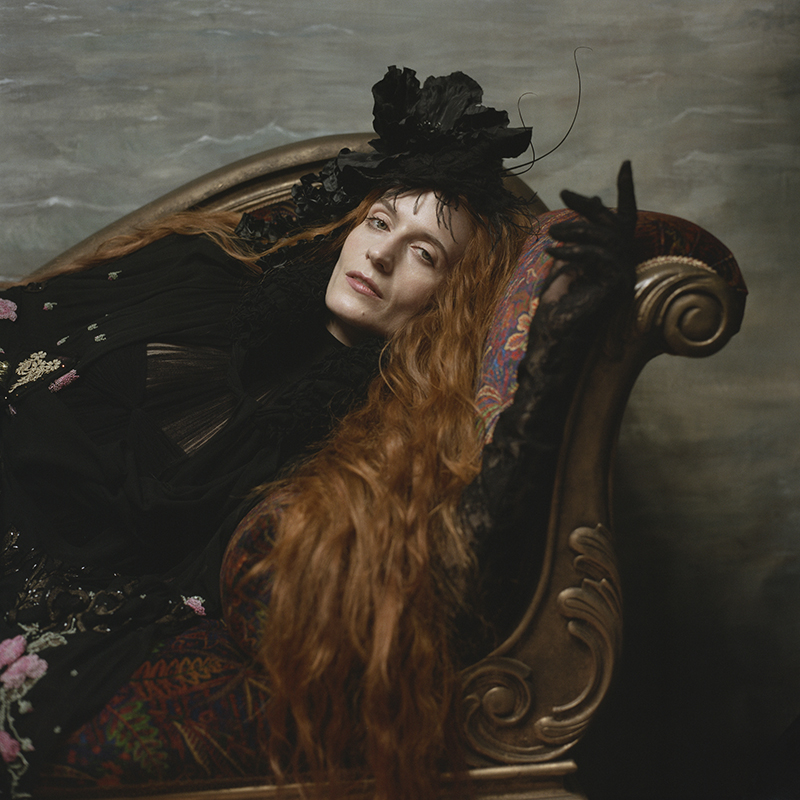Music Review: Florence and the Machine’s ‘Dance Fever’
Fresh out of isolation, Florence and the Machine makes a glorious and cinematic return with a new album.

“Tell me where to put my love,” Florence Welch sings on “My Love,” released earlier this spring. Whether this is a question, demand, or a plea is left up in the air, but the desperation in her voice is unmistakable. Written in a time of personal creative stagnation, the feeling she poured into those lyrics eventually became the key to breaking out of it, and the album that grew out of it is full of the joy of artistic rebirth.
After 2018’s inward-looking and relatively stripped-back High as Hope, Florence and the Machine’s latest release, Dance Fever (★★★★☆) finds Welch and her band embracing a beautifully baroque grandiosity.
So much of Dance Fever feels deeply cathartic, finding release in lush arrangements throughout and a handful of soaring, anthemic tracks. On its face, the album delivers on its label, following up the slow-burning opener with “Free,” probably the album’s most straightforwardly danceable single.
But Welch loves a multilayered meaning, and unsurprisingly, she takes a broader view of the idea of dancing fever. Both the title and the almost-title track “Choreomania” encapsulate Welch’s admitted fascination with medieval dancing plagues, bouts of collective mania when people would literally dance themselves to death.
Welch’s allusion to them is tongue-in-cheek, but she leaves it clear that they find plenty of handy parallels in a cultural moment when so much seems to be hanging on by a thread.
Despite the celebratory mood Welch finds herself in, a sense of tension between everyday worries and the fraughtness of the present moment rears up again and again throughout Dance Fever in different forms. On the first track, “King,” she puts a fine point on it, beginning with the lines, “We argue in the kitchen/about whether to have children.”
For Welch, past and present are bound up as intimately as the personal and the global. From its many literary and religious nods to the dramatic pre-Raphaelite imagery surrounding the album’s release, Welch signals constantly to both the historical and the mythical past for inspiration, but always in the service of the present moment.
Welch packs some of her most pointed observations into the latter half of Dance Fever, and the album becomes palpably more intense past its halfway point. “Girls Against God” is full of both righteous anger and self-deprecating awareness of her own ego, brought together in the lyrics, “When I decided to wage holy war/it looked a lot like staring at my bedroom floor.”

Even with the imagery of crying into her cereal in the middle of the night, however, she is fully believable when she lands the line, “Oh God, you’re gonna get it.” Religious themes return later on, on the unsettling and measuredly intense “Cassandra,” this time with a vaguely pagan bent, as she sings with a sneer, “All the gods have been domesticated.”
Though she has never been afraid to get cerebral, Welch has noticeably honed and sharpened her songwriting prowess. She deftly toys with expectations, packaging themes and moods in unexpected ways.
The late-album standout “Daffodil” comes in with a dissonant opening before its strutting beat picks up, Welch singing with gothy ambivalence about the beauty of the world over crunchy electric guitars. “Sometimes I see so much beauty, I don’t think that I can cope,” she muses, adding that she “saw the future in the face of a daffodil,” nodding to the flower’s classical associations with sleep, toxicity, and narcissism.
Welch shows us the other side of the coin a few tracks later, with the “The Bomb,” which features her singing in a comfortable, relaxed lilt about her self-destructive tendencies and the chaos she knowingly sows in her own relationships.
Florence and the Machine has read the room well this time around. Dance Fever drips with references to the medieval and mythic that manage to feel immediate and visceral at a moment when the world is a bizarre between-state, exhausted and ready to move on from a deadly plague but still viscerally feeling its effects. The album may have been born of an anxious and uncertain time, but is shot through with a cathartic and welcome sense of relief.
Dance Fever is available to purchase and stream everywhere. Visit www.florenceandthemachine.net.
Support Metro Weekly’s Journalism
These are challenging times for news organizations. And yet it’s crucial we stay active and provide vital resources and information to both our local readers and the world. So won’t you please take a moment and consider supporting Metro Weekly with a membership? For as little as $5 a month, you can help ensure Metro Weekly magazine and MetroWeekly.com remain free, viable resources as we provide the best, most diverse, culturally-resonant LGBTQ coverage in both the D.C. region and around the world. Memberships come with exclusive perks and discounts, your own personal digital delivery of each week’s magazine (and an archive), access to our Member's Lounge when it launches this fall, and exclusive members-only items like Metro Weekly Membership Mugs and Tote Bags! Check out all our membership levels here and please join us today!
























You must be logged in to post a comment.